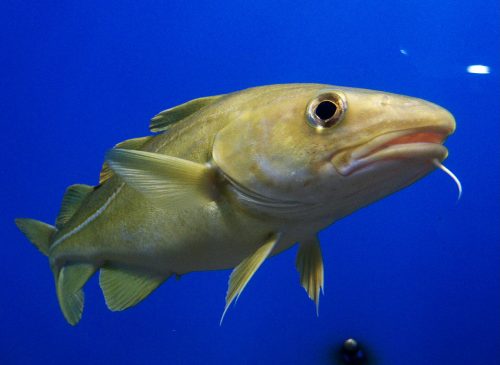What happens when a southern fish meets a potential partner from the north who doesn't understand what he wants to tell her? In the case of the cod fish, which are migrating north due to climate change, short communications may impair their ability to reproduce

By Shahar Shluh, Zveta, Science and Environment News Agency
You are in the sea, a little after sunset, take another sip to gather courage and start talking to someone who is swimming next to you very gracefully. You try your most successful opening line on her, but unfortunately all your passionate courting attempts are met with silence - a few air bubbles at most. It's not easy being a fish that swims outside of its normal waters.
Fish are considered great communicators, but the cod fish (Gadus, also known as clone and cod) communicate with each other through sounds they produce with the help of their swim bladder (a gas-filled sac found in the belly of certain fish species that helps them control their buoyancy). The sounds made by the fish help them, among other things, attract partners to mate.
According to new research, the cod fish have the ability to change the sound patterns and make thumping and growling sounds at different frequencies - this fact means that fish from different regions have different idioms (dialects). Professor Steve Simpson of the University of Exeter, who studies the cod fish population, says that the sounds of American cod fish are very different from the sounds of their European cousins. As a result, there was concern that if a male cod is unable to "chat" with female cod (because they speak different dialects), then his ability to reproduce is in danger.
The communication problem arose due to climate change. When the temperature of the sea rises, marine creatures that live in cold water, among them the cod fish, migrate north. When populations from different areas of origin come into contact for the first time, they do not have a common vocal repertoire and may have difficulty integrating with each other, sharing territory and breeding.
But the troubles of the talking fish do not end here. Simpson, who studied fish in coral reefs, found that they are also vulnerable to noise pollution, and new research aims to find out what is happening in UK seawater to fish such as cod and haddock (Melanogrammus aeglefinus), another species that uses its voice to communicate. Since vocal communication is necessary for the fish's survival, sound pollution is a serious threat to them. However, Simpson says that sound pollution is relatively easy to solve compared to other environmental damages: if boats avoid sailing in the cod and haddock spawning areas during key periods (breeding season, for example), the sound pollution damage will be reduced.
The noise in the sea is increasing
Prof. Nadav Shasher, an expert in the behavior of marine animals from the Faculty of Natural Sciences at Ben Gurion University, points out that communication between fish is at low frequencies of 0 to 10 kilohertz and also that most of the noises of machines, such as ship engines, power plants and pumps, are at these frequencies. Therefore, there is logic in Simpson's proposal, but it only solves part of the problem.
"We know that the noise in the sea is increasing, especially in places where there is human activity such as ports and desalination plants, and then we see a change in the behavior of the animals," says Shasher. "The question is how much the noise disturbs and whether the animals have the ability to adapt to the new situation. Not much is known about vocal communication between fish. It is known that it is mainly used for courtship and aggression, but communication to protect the flock, for example, is not so well known."
even in the high frequencies
The noise in the sea affects not only fish and it also goes beyond the effect of the low frequencies on them. "Most of the research today looks at the effect of noise on marine mammals that work at higher frequencies," explains Shasher. "There are, for example, results that show that whales stay away from training areas of the US Navy because it uses sonar to search for submarines."
Shasher adds that fish have several strategies for dealing with noise pollution, such as changing course and increasing the volume of the sounds they make. However, increasing their volume is only suitable for some functions and is only possible for some animals - marine mammals, for example, can increase their volume but fish cannot. However, not much is known about the adaptation of marine animals to noise. This field of research has only existed in the world for 15 years and in Israel it is completely new. New, but relevant mainly in view of the gas drilling in the Mediterranean Sea, which according to Shasher may have a negative effect on the marine mammals that live in its waters.
